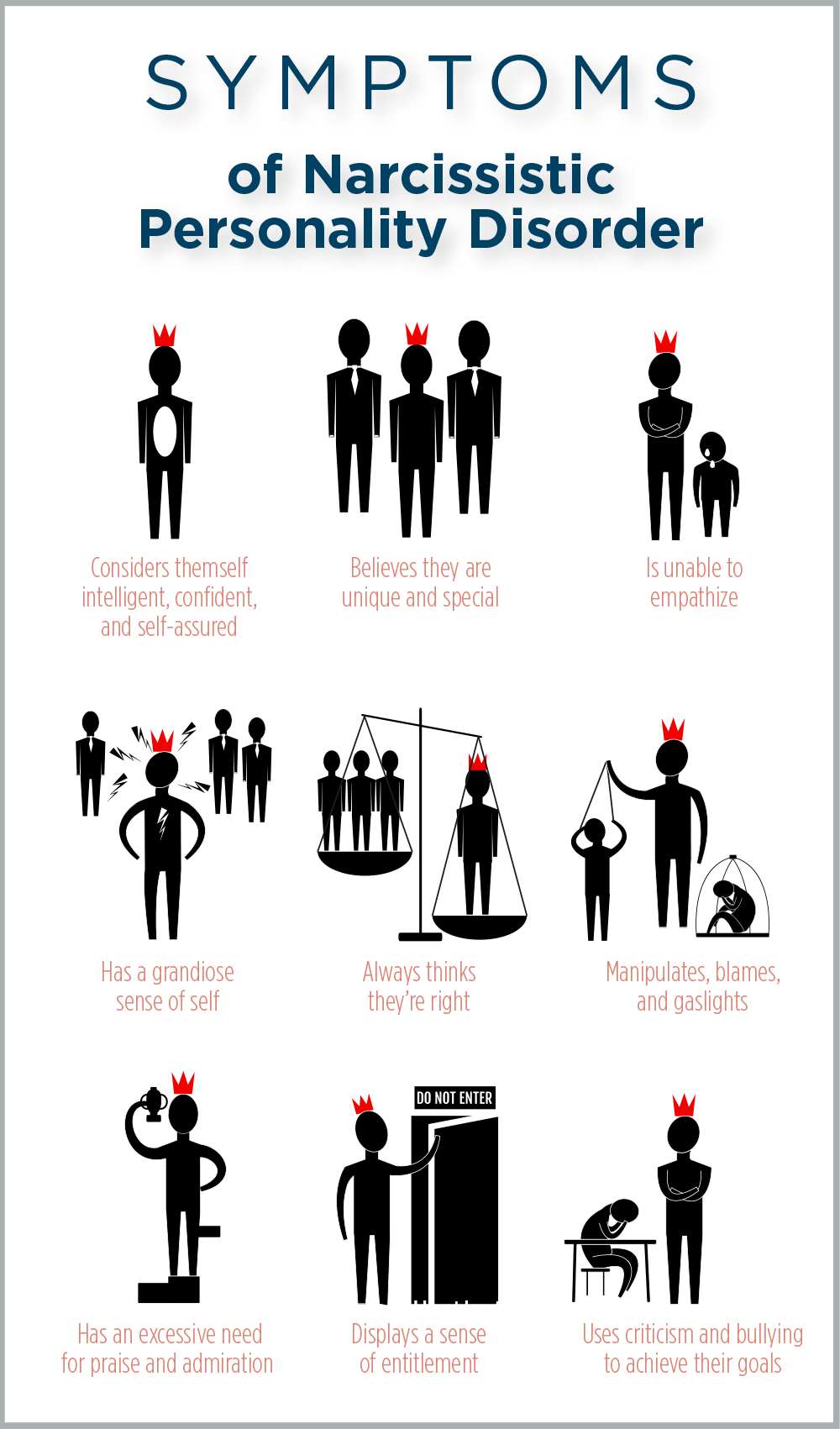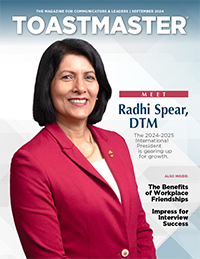Trying to communicate with someone who blames, manipulates, gaslights, dominates, or belittles you for their own gain can leave you feeling confused, unheard, and invalidated. Unfortunately, people with complex personalities are everywhere—at home, work, and even Toastmasters clubs. Maybe you have a coworker who constantly demeans you or your ideas, or a partner who insists that you are just imagining things when there are problems. According to the British Journal of Psychiatry, the rate of people currently living with a personality disorder is estimated at 7.8% worldwide.
I’ve been a psychologist for over 20 years, and I have a Ph.D. in the field of psychology, and yet it took me two years of therapy to understand that I was in an unhealthy relationship. Constantly trying to rescue a relationship by apologizing and surrendering your needs to take care of the other person can leave you exhausted—especially if the person has a complex personality such as narcissim. The trauma bond, or the narcissistic abuse cycle that accompanies narcissism, often results in post-traumatic stress symptoms, anxiety, and depression.
Sometimes you will have to walk away from the narcissistic relationship because the short-term pain of ending the relationship will result in long-term gain for your health and well-being.
Narcissism is a significant social problem, and combatting it begins with education. Learning why people develop narcissism and how to communicate with the narcissist is the first step. Given that positive social relationships are foundational to well-being, learning how to communicate with complex personalities will not only protect your well-being, but theirs as well.
What Is Narcissism?
When someone displays extreme narcissistic characteristics, such as the case with a narcissistic personality disorder (NPD), then problems can start to arise. People diagnosed with NPD consider themselves as self-assured, intelligent, confident individuals, with a strong sense of right and wrong. However, in reality, someone living with NPD is often a deeply insecure person who has a profound lack of confidence and self-esteem. This is often a result of childhood trauma, genetics, and an insecure attachment style.

For example, someone born with an anxious temperament who has self-absorbed and emotionally unavailable parents grows up fiercely independent, believing that they have to take care of themselves and prove to the world that they are worthwhile and special. NPD is a serious mental health condition with complex symptoms such as an inability to empathize, diminished self-reflection and insight, and an excessive need for praise and admiration. Although there are different types of narcissism (e.g., covert/vulnerable or grandiose) the root cause of the problem is often the same.
Narcissism does not allow people to fully understand or regulate their emotions. You might know some people who must control their environment or avoid feelings such as shame or rejection.
Here are some examples of workplace scenarios you might encounter when dealing with a narcissist.
The vulnerable/covert narcissist might cope by becoming a victim:
Sally: “You haven’t been getting your reports in on time as we discussed; please get the report in on time this week.”
Bruce: “I can’t seem to do anything right. I try so hard, and I still get criticized. I’m such a bad employee.”
The grandiose narcissist might cope by blaming the other person:
Celia: “Well if you didn’t give me so much work and you stopped micromanaging me, I might get the reports in on time.”
Worst of all is the narcissist who gaslights you:
Helen: “Remember you said that the report wasn’t due until Monday. You’re so stressed out lately, you’ve probably got me confused with George’s team.”

Narcissists are less interested in team harmony and success, and more interested in using others to pursue their own agenda. Many narcissists will take responsibility for others’ accomplishments. They set perfectionistic standards and are often workaholics. They may even use bullying tactics to achieve their goals. For example, withholding information to sabotage coworkers’ performance, persistently criticizing, and spreading gossip. The covert and vulnerable narcissist is more likely to act vindictively—make sure you keep records of conversations and limit information provided to them.
Narcissism can lead to serious mental health issues such as burnout, compassion fatigue, depression, and anxiety. A narcissistic boss can erode your self-esteem, make you feel incompetent, and cause you to lose trust in yourself and others. If you are not careful, narcissism can also damage your career.
Narcissists aren’t just confined to the workplace—often, the people we love the most display tendencies. In the following example, Barry, who is a very attentive husband, is faced with his wife’s narcissistic rage when he tries to change plans.
Barry: “I know we planned dinner tonight, but I have an old friend in town, and I’d love to go out to dinner with her—can we reschedule for tomorrow night?”
Fiona: “You always do this; you never make me a priority in your life. You are so selfish and inconsiderate. You knew I’ve been looking forward to tonight. Why are you choosing to go out with another woman on our date night?”
Barry: “But I hardly ever cancel plans. Of course I love you …”
In this instance, even though Barry would love to see his friend from out of town he decides to go out with his wife to placate her. However, over time, this will cause him to lose sight of himself. The narcissistic loop of manipulation, blame, gaslighting, etc., can derail constructive conversations and be mentally exhausting.
There Is Nothing Wrong With You
Truthfully, having a relationship with a narcissist can make you feel like there is something seriously wrong with you. But you’re not the monster they make you out to be. Elinor Greenberg, therapist and author of the book Borderline, Narcissistic, and Schizoid Adaptations: The Pursuit of Love, Admiration and Safety, explains that when narcissists feel good about you (or more accurately that you are making them feel good about themselves), they see you as special. Then you do something “wrong” (e.g., say “no” to one of their requests), and suddenly you’re bad and worthless.
Therefore, people with NPD only see people (including themselves) in one of two ways: Either they are special, unique, perfect, and entitled (High Status); or they are defective, worthless, garbage (Low Status). Boundaries are your best friend if you want to stay connected to your truth when in a relationship with a narcissist.
Boundaries, Boundaries, Boundaries
Maintaining boundaries can be particularly challenging when communicating with a narcissist. Narcissists are masterful at blurring boundaries. Paul Mason and Randi Kreger, authors of the top-selling book Stop Walking on Eggshells, developed what they call the broken record technique to help people maintain boundaries when communicating with difficult personalities.
The broken record technique helps you avoid the white noise (gaslighting) produced by the narcissist by staying focused on the issue at hand. Going back to Barry and Fiona, you can see how Barry could have used the broken record technique to enforce his boundaries.
Fiona: “You always do this; you never make me a priority in your life. You’re so selfish. You knew I’ve been looking forward to tonight. Why are you choosing to go out with another woman on our date night?”
Barry: “I know you’re disappointed and I’m hearing that you want to spend time together. We will have our date night tomorrow night, but right now it’s important to me that I see my friend.”
Fiona: “But you’re choosing to go out with another woman on our date night. Are you having an affair with her?”
Barry: “It’s concerning that you think that, and we can absolutely discuss these issues later if you want. But as I said, right now it’s important that I see my friend.”
Fiona: “You’re not listening, I don’t want you to go out with her.”
Barry: “I know you’re disappointed, but as I said, it’s really important to me that I see my friend and we’ll have our date night tomorrow night.”
No matter what Fiona throws at Barry, he’s going to repeat the same thing, just like a broken record. Barry doesn’t get caught up in the white noise and he remembers “just because they say it doesn’t mean it’s true.” Fiona is triggered and stressed, and she is struggling to manage her own emotions. By staying calm, respectful, and assertive, Barry has a greater chance of getting his needs met.
Safety and Self-Care
When your boundaries stop the narcissist from getting their needs met, it can result in a high level of stress and hurt for them. Self-care is critical when dealing with the narcissist because as the saying goes, hurt people hurt people. If the narcissist is someone in your family or close circle, be sure to spend time with other people, go to yoga, go to therapy, eat well, and remember, you are not responsible for their emotions. Sometimes you will have to walk away from the narcissistic relationship because the short-term pain of ending the relationship will result in long-term gain for your health and well-being.

Julie Hall, author of The Narcissist in Your Life, argues that the narcissistic mentality of superiority and entitlement results in scapegoating people who are different. Scapegoating increases conflict and tribal thinking and reduces diversity, collaboration, and cooperation. Narcissism underpins significant social problems, such as sexism, racism, and queerphobia, and, unsurprisingly, wreaks havoc with workplace morale and team performance.
It pays to be strategic when communicating with a narcissistic colleague or manager at your workplace. Remain objective, don’t approach the narcissist with high emotions, and choose your battles. For example, know when to play the game and know when to stand up to the narcissist. You may benefit from aligning yourself with people you trust and who will support you if the narcissist tries to undermine you or steal your ideas.
Recognizing narcissism in the workplace will not only protect your mental health, but it can help to protect your career as well.
No matter how much hurt we cause each other, we should default back to compassion, but with boundaries. Narcissism is actually a front for deeply vulnerable and insecure people. Boundaries and self-care are paramount when dealing with narcissism, but anger and retaliatory behaviors serve no one well in the long run. It is possible to have a healthy relationship with people who have complex personalities and maintain compassion for their pain, but awareness and boundaries are advised.
Kristen Hamling, PhD is a trauma and positive psychologist and a Toastmaster in Whanganui, New Zealand. She is the founder of Wellbeing Aotearoa, which focuses on trauma-informed well-being practices. A facilitator, coach, and researcher, she has also served in the Australian Army Reserve. Learn more on her website.
Related Articles

Club Experience
Dealing with Challenging Personalities

Communication
Mastering Controversial Conversations

Club Experience


 Previous
Previous

 Previous Article
Previous Article